Femia > Health Library > Your cycle > Health > Can you get pregnant on your period? Understanding the odds and timing
Can you get pregnant on your period? Understanding the odds and timing
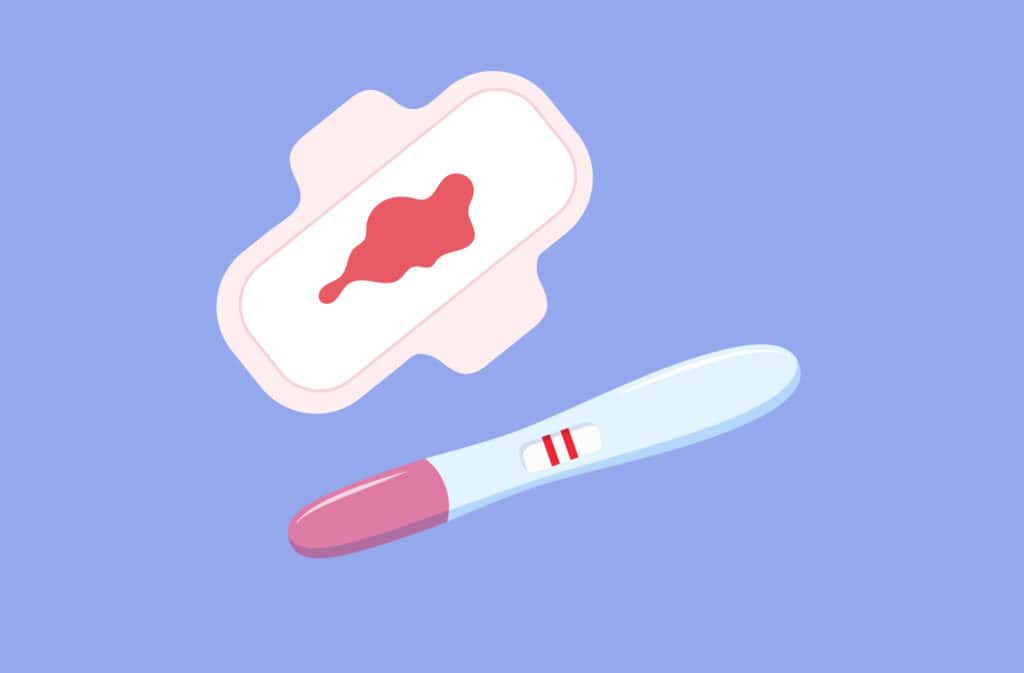
- Updated Feb 10, 2025
- Published
CRAFTED BY HUMAN
Crafted by human At Femia, we provide accurate and up-to-date information at every stage of your journey, from trying to conceive, pregnancy and postnatal support. All content is created by a real person based on in-depth research and own professional experience. Femia ensures that you will receive expert advice, strict accuracy and a personalized approach from our authors/medical experts. Learn more about our editorial policy.
FACT CHECKED
Fact checked At Femia Health, we maintain the highest standards of editorial excellence in delivering content focused on helping you conceive, guiding you through pregnancy, and supporting you postpartum. Explore our content review principles to learn how we ensure the accuracy and quality of our health and lifestyle tips for every stage of your journey.
- Getting pregnant from sex during your period is very unlikely, but possible.
- Your fertile window starts from five days before you ovulate and lasts until one day after, so having short or irregular cycles can increase your chances of getting pregnant during your period.
- There is no ”safe” time during your cycle to have sex. So, if you don’t want to get pregnant, the best way to protect yourself is by using contraception.
Whether you’re hoping to conceive or trying to avoid it, you might be wondering if there is any time during your cycle where having unprotected sex is ”safe” from pregnancy.
The short answer is no—there is no time in your cycle where you can guarantee you won’t get pregnant if you have sex. But, there are days when the chances are much lower.
The long answer is a bit more complicated. You need to know how the menstrual cycle works, what the ”fertile window” is, and most importantly, get to know your own unique body.
But, don’t panic! If you’ve ever wondered whether you can get pregnant on your period, you’re definitely not alone—and you’ve come to the right place. Here, we will break things down for you and help you understand how pregnancy can happen, even during your period.
any time of the month
Femia offers the most accurate tool for determining fertile days
Can you get pregnant while on your period?
Lots of people believe that having unprotected sex during their period is a ”safe” time and means you can’t get pregnant. However, while it’s true that most women won’t get pregnant from sex during their period, it’s not impossible.
A brief overview of the menstrual cycle and fertility
The menstrual cycle is your body’s way of preparing itself each month to potentially get pregnant. According to the American College of Obstetricians and Gynecologists (ACOG), the average menstrual cycle lasts around 28 days, but anywhere from 21–35 days is considered normal.
| An important note: |
|---|
| Some women find that their cycle is shorter or longer than this or that it changes from month to month. This can be completely normal, so try not to worry. But, it’s best to run any concerns you might have past your healthcare provider. They can look at your cycle in detail and give you the best advice about what to do next. |
To help you understand how getting pregnant on your period could be possible, let’s first breakdown the menstrual cycle.
Your cycle starts on the first day of your period and has four phases:
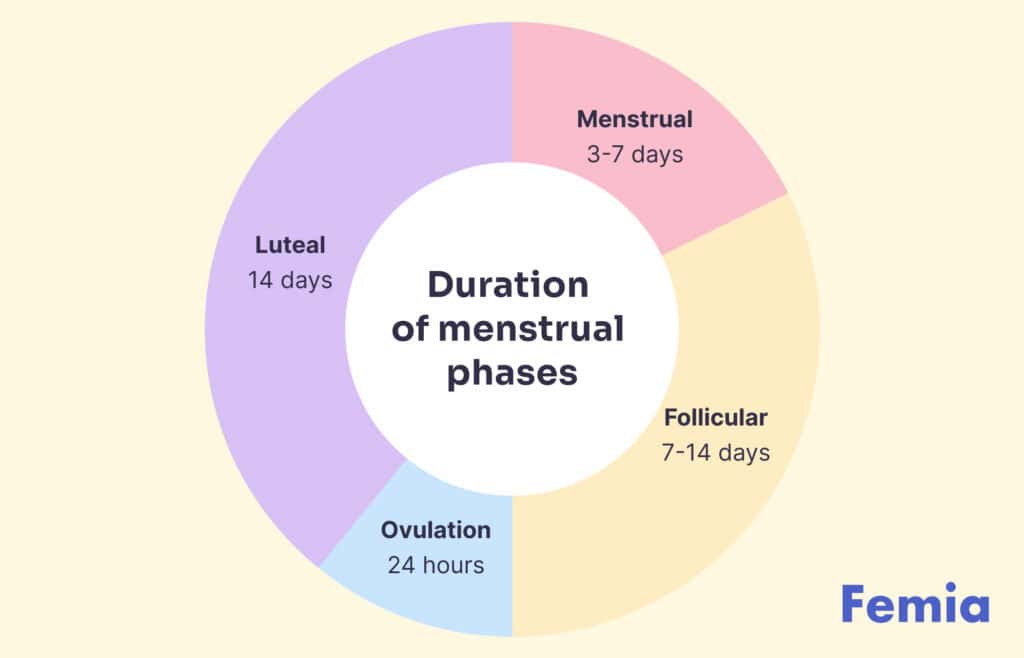
- Your period. This usually lasts between 3–7 days, and it’s how your body gets rid of the old uterine lining that built up during the last cycle. Since you didn’t get pregnant last cycle, your body ”resets,” ready for its next chance.
- The follicular phase. This lasts from day 1 to around day 14. Changing hormone levels cause your uterus lining to start thickening again, and follicles develop in your ovaries. One follicle will mature into an egg.
- Ovulation. This is the big day—your ovaries release an egg. It typically happens in the middle of your cycle, about two weeks before your next period. Having unprotected sex just before or during this time is when your chances of getting pregnant are best.
- The luteal phase. The uterus lining continues to thicken as the egg travels through the fallopian tubes to your uterus. If fertilized by a sperm cell, it will attach to the uterus wall, which is now thick and ready to welcome it, and you will become pregnant. If this doesn’t happen, then your hormones will fall, triggering the start of your period and a new cycle.
👉Find out more: Bleeding during ovulation: Could it be a sign of pregnancy?
Taking a look at your fertile window
According to an important study published in the New England Journal of Medicine in the 90s, women are fertile for around six days each cycle. These six days are known as the “fertile window,” and they include the five days before ovulation and the day you ovulate. This usually occurs in the middle of your cycle; for a 28-day cycle, that is around day 14.
During this time, there is a high chance of unprotected sex leading to pregnancy, because sperm can survive in your body for up to 5 days. So, even if you haven’t released an egg yet, the sperm can hang around and wait to fertilize it.
If your cycle is around 28 days and regular, then you probably ovulate around day 13–14, which means you’re fertile from about day 8. Your chances of getting pregnant from sex during your period are therefore likely to be very low. But, here comes the important part: if your cycle is shorter or longer than this, the day you ovulate changes, and that means your fertile window also changes.
Let’s have a look at what a shorter cycle could look like:
Day 1. Your period starts.
Day 5. You have unprotected sex.
Day 6. Your period finishes.
Day 10. You ovulate. (Your fertile window starts on day 5)
Day 20. Your period is due.
As you can see, if you ovulate on day 10, your fertile window starts on day 5—while you’re still on your period. So, in this scenario, there’s a chance that you could get pregnant from having sex during your period.
You might be thinking, I have a regular 28 day cycle, so I’m safe, but here’s where it gets tricky. Even women with regular cycles can have a one-off month where things don’t go to plan. And, you often don’t know your cycle is going to be shorter or longer than expected until it‘s already happened.
Chances of getting pregnant during your period
So, now that we’ve established it is possible to get pregnant on your period, you‘ll probably want to know exactly how likely it is.
A study by Wilcox found that 2% of women are already in their fertile window by day four of their cycle, which is often still during their period. By day seven, 17% of women are in their fertile window, and by days 12–13, 54% are fertile. For women with cycles shorter than 27 days, the study found that one third of them were fertile by day seven.
If you have a long period and a short cycle, your chances of being fertile towards the end of your period are much higher than if you have a long cycle or a short period.
@femia.fertility Absolutely! However, the chances are minimal depending on the length of your menstrual cycle and period duration. Planning your 'baby dance' during your fertile window is a great start if you want to increase your odds of conceiving. Join us to discover natural ways to boost your fertility with proven hacks for conceiving ❤️ #fertility #highfertility #ttc #periodtok #fertilitydoctor #fertilityawareness ♬ Carmen Habanera, classical opera(1283412) - perfectpanda
Factors that increase the chances of conception on your period
- Short cycles. Having a short menstrual cycle increases your chances of ovulating earlier and being fertile while still on your period.
- Long periods. Some women are fertile from day seven. So, if your period lasts a week, there is a chance that you could be fertile towards the end of it.
- Irregular cycles. If you have irregular cycles, it can be very hard to predict when you will ovulate. You might be in your fertile window much earlier or later than you expected.
- Unusual bleeding. Sometimes, women can mistake vaginal bleeding from other causes for their period and think it’s safe to have unprotected sex. In fact, they are usually actually having ”spotting,” not a period, and could be fertile.
👉Find out more: Pink discharge: Causes and what you can do about it
Keep in mind that having a regular cycle now doesn’t mean it will always be regular. Various factors like lifestyle changes, weight fluctuation, stress, medication, or medical conditions can alter your cycle, whether temporarily or longer term. And, you might not even realize until it‘s happening.
Can you get pregnant right before your period?
An egg can only survive for up to 24 hours after it’s released. So, if you have a 28–day cycle and ovulate around day 14, it’s unlikely you’ll get pregnant just before your next period. But, it’s important to note that the exact day you ovulate can vary, sometimes for no obvious reason. If you have a longer cycle, then you can be fertile right before or around the time you expect your next period.
In fact, a study by Wilcox found that for women with cycles spanning five weeks, 4–6% were in their fertile window right before their next period. Even women with regular cycles had a 1–6% chance of being fertile on the day their next period was expected.
Common misconceptions about period sex and pregnancy
Myth: You can’t get pregnant on your period.
Truth: While the chances are low, it is still possible. Sperm can live inside the uterus for up to five days, so if you have a shorter cycle and ovulate soon after your period, then it’s possible that there is still sperm waiting around.
Myth: Period blood acts as a barrier to sperm.
Truth: Period blood doesn’t stop sperm from reaching an egg or from surviving in your body.
Myth: Period sex is messy and unhealthy.
Truth: While it can be a bit messy, it’s perfectly safe and natural. Many couples still enjoy having sex during this time, and some women even find it helps relieve cramps.
Safe sex during your period
Having sex during your period is completely normal, but it’s important to remember that even though the odds of getting pregnant are low, it is still possible. If you’re not trying to get pregnant, then it’s a good idea to use contraception to protect yourself.
Many different types of contraception are available, so you should be able to find one that suits your body, lifestyle, and needs. Methods like condoms, the pill, and IUDs are all still effective during your period. To find the right fit for you, chat with your healthcare provider. They will be able to run you through the different options available and help choose the best option for your body and your needs.
If you’re trying to conceive, then the best time to have sex is in the five days before ovulation. Tracking your cycle can help you to predict when you might ovulate and enable you to time sex accordingly. You can track your cycle using an app or the old fashioned way, with pen and paper. Either way, remember to record different symptoms like cervical mucus and ovulation pains as well as when your period starts and finishes. If you do this over a few months, you might start to see a pattern.
Tracking your cycle is also a great way to spot any unusual changes. If you notice something off, sharing the information with your healthcare provider can help them determine if any further tests are needed.
any time of the month
Femia offers the most accurate tool for determining fertile days
Questions from Femia community
Can I ovulate while still on my period?
It's unlikely, but possible. If you have a short cycle, ovulation can happen shortly after a period, which could overlap with the tail end of menstruation. And, even if you don’t ovulate during your period, sperm can live inside your body for up to five days, so unprotected sex during your period can still result in pregnancy.
Does period sex affect fertility or ovulation?
No, having sex during your period doesn't change when you ovulate. Ovulation is determined by changes in your hormones and cannot be influenced by having sex.
How soon after my period can I start ovulating?
Most women ovulate around day 14 of their cycle, so roughly around a week after their period ends. However, if you have a shorter cycle, then you will ovulate earlier. For some women, this can happen shortly after their period finishes.
The best thing you can do is to start tracking your cycle using an app. After a few months you will hopefully be able to get an idea of how long your cycles are and when you tend to ovulate. Just remember, nothing is set in stone. Even those with the most regular cycles can still have an odd month where they ovulate much earlier or later than expected.
The bottom line
Getting pregnant during your period is unlikely…but not impossible.
If you have short or irregular cycles, then your chances of conceiving from sex during pregnancy go up. This is because sperm can live inside your body for up to five days. So, if you ovulate soon after your period finishes, it‘s possible that having sex towards the end of your period means there are sperm cells still alive when you release an egg.
Tracking your cycle over a few months should help you figure out your cycle length and when you can expect to ovulate. This should give you a good idea of when you’re fertile. Just don’t forget that cycle length can change; so, if you’re not trying to get pregnant, then using contraception is the safest option.
References
- Campbell, Lily R., et al. “Menstrual Cycle Length and Modern Living: A Review.” Current Opinion in Endocrinology Diabetes and Obesity, vol. 28, no. 6, Oct. 2021, pp. 566–73. https://doi.org/10.1097/med.0000000000000681.
- Department of Health & Human Services. “The Menstrual Cycle.” Better Health Channel, www.betterhealth.vic.gov.au/health/conditionsandtreatments/menstrual-cycle.
- Johanna Rief, et al. The Menstrubation Study. June 2021, menstrubation.com/wp-content/uploads/2021/03/WMZ_Menstrubation-Results_Report_UK.pdf.
- “The Menstrual Cycle: Menstruation, Ovulation, and How Pregnancy Occurs.” ACOG, www.acog.org/womens-health/infographics/the-menstrual-cycle.
- “Menstrual Cycle: What’s Normal, What’s Not.” Mayo Clinic, 22 Apr. 2023, www.mayoclinic.org/healthy-lifestyle/womens-health/in-depth/menstrual-cycle/art-20047186.
- “Ovulation Signs: When Is Conception Most Likely?” Mayo Clinic, 9 July 2024, www.mayoclinic.org/healthy-lifestyle/getting-pregnant/expert-answers/ovulation-signs/faq-20058000.
- Wilcox, A J, et al. “The Timing of the ‘Fertile Window’ in the Menstrual Cycle: Day Specific Estimates From a Prospective Study.” BMJ, vol. 321, no. 7271, Nov. 2000, pp. 1259–62. https://doi.org/10.1136/bmj.321.7271.1259.
- Wilcox, Allen J., et al. “Timing of Sexual Intercourse in Relation to Ovulation — Effects on the Probability of Conception, Survival of the Pregnancy, and Sex of the Baby.” New England Journal of Medicine, vol. 333, no. 23, Dec. 1995, pp. 1517–21. https://doi.org/10.1056/nejm199512073332301.
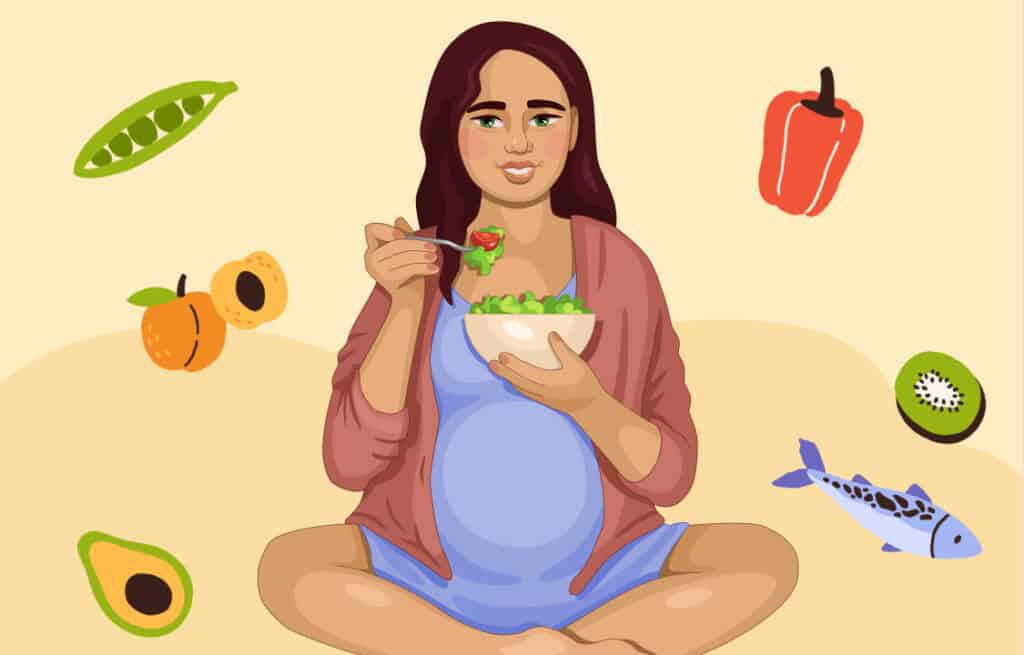
Learn how to manage your gestational diabetes with this 7–day meal plan. Enjoy balanced meals and snacks designed to keep your blood sugar stable and support a healthy pregnancy.
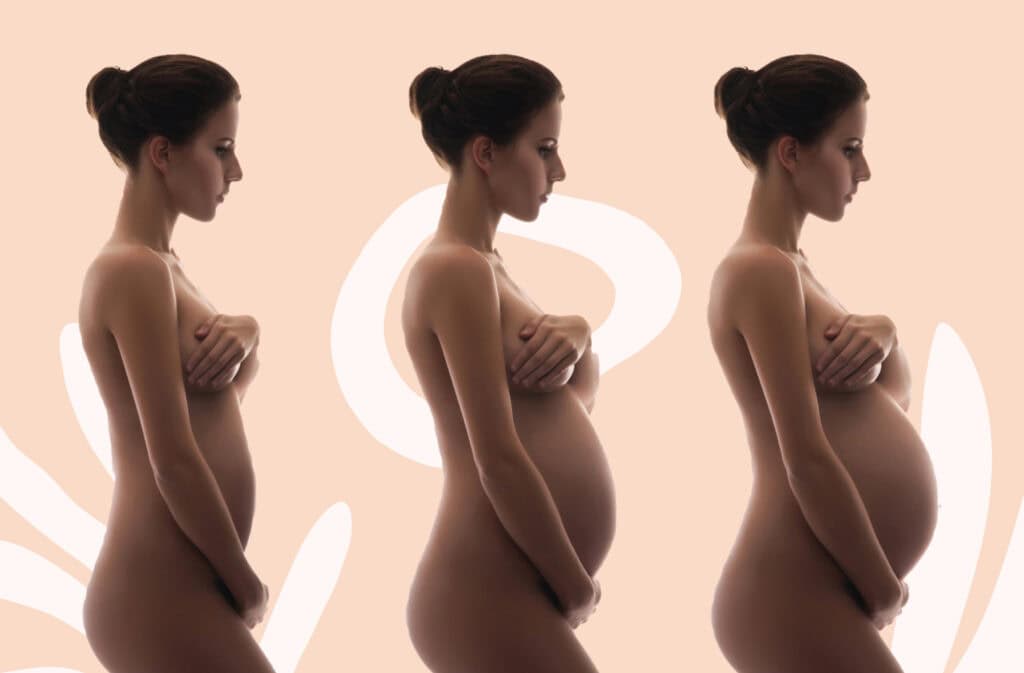
Discover the complete week-by-week guide about the size and stages of the pregnant belly, how it grows, and what to expect during each trimester.
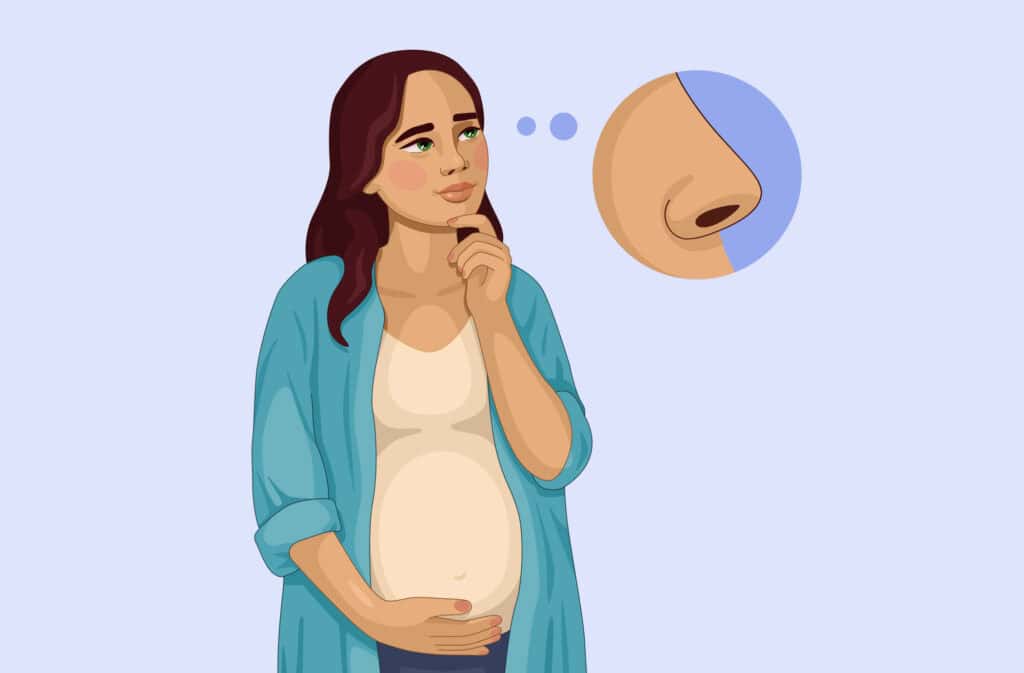
Yes, pregnancy nose is a real thing. Here is why it happens, how can you treat it and when can you hope for it to go away.

